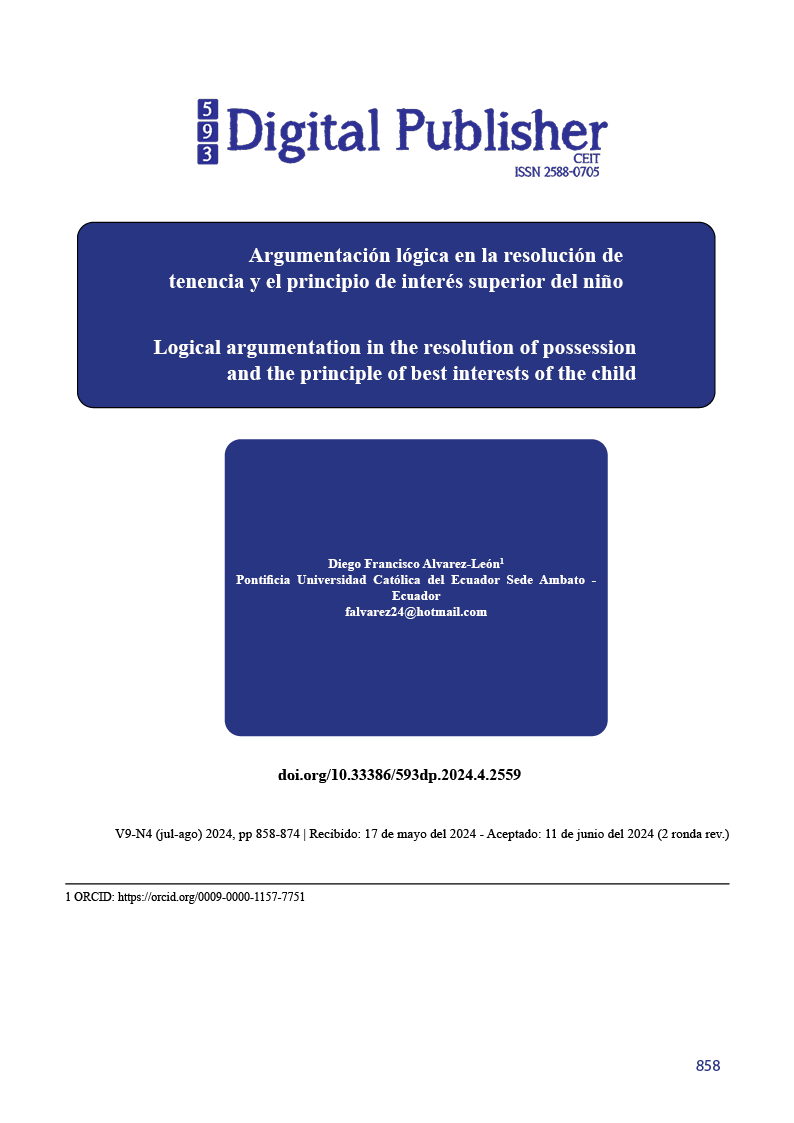Argumentación lógica en la resolución de tenencia y el principio de interés superior del niño
Contenido principal del artículo
Resumen
La tenencia como un atributo de la patria potestad, hace referencia al derecho que tiene el progenitor para vivir con el niño asumiendo la responsabilidad de su crianza, atención y cuidados. Luego que los padres se separan y no existe acuerdo entre ellos para ejercer la tenencia de los hijos, esta es resuelta por el juez de familia quien dictará medidas, salvaguardando el interés superior, y recurriendo a la argumentación lógica. Este artículo analiza la argumentación aplicada por los jueces de familia y que es utilizada para tratar de convencer, con argumentos conformados por premisas para tutelar el interés superior de niño. Esta investigación tuvo como objetivo realizar un análisis crítico jurídico respecto a la argumentación lógica utilizada en la Unidad Judicial de Familia de Latacunga en los años 2022. Se recurrió al método de análisis documental, bibliográfico, analítico sintético y descriptivo, analizando resoluciones emitidas de tenencia en los años descritos y planteando entrevistas a tres jueces de la localidad que se valora como juicio de expertos En tal sentido, el resultado evalúa la aplicación de la argumentación lógica dentro de los juicios de tenencia y su incidencia en el interés superior del niño.
Descargas
Detalles del artículo

Esta obra está bajo una licencia internacional Creative Commons Atribución-NoComercial-CompartirIgual 4.0.
1. Derechos de autor
Las obras que se publican en 593 Digital Publisher CEIT están sujetas a los siguientes términos:
1.1. 593 Digital Publisher CEIT, conserva los derechos patrimoniales (copyright) de las obras publicadas, favorece y permite la reutilización de las mismas bajo la licencia Licencia Creative Commons 4.0 de Reconocimiento-NoComercial-CompartirIgual 4.0, por lo cual se pueden copiar, usar, difundir, transmitir y exponer públicamente, siempre que:
1.1.a. Se cite la autoría y fuente original de su publicación (revista, editorial, URL).
1.1.b. No se usen para fines comerciales u onerosos.
1.1.c. Se mencione la existencia y especificaciones de esta licencia de uso.
Citas
Aranjuez, T. (2018). Argumentación jurídica y ética de la virtud. Editorial Reus. https://elibro.net/es/ereader/utiec/121258
Atienza, M. (2013). Curso de argumentación jurídica. Trotta. https://drive.google.com/drive/u/0/my-drive
Bernache, F. (2019). Conceptos y esquemas en la argumentación. Sincronía, xxiii (76), 105-135. https://doi.org/10.32870/sincronia.axxiii.n76.6b19
Comité de los Derechos del Niño de Naciones Unidas. (2013). Observación general No 14 (2013) sobre el derecho del niño a que su interés superior sea una consideración primordial (artículo 3, párrafo 1). https://www.observatoriodelainfancia.es/oia/esp/documentos_ficha.aspx?id=3990
Dabove, M. I. (2015). Argumentación jurídica y eficacia normativa: hacia un sistema integral del funcionamiento del derecho. Díkaion, 24(1), 36-65. https://doi.org/10.5294/DIKA.2015.24.1.3
Domínguez, Matías, & Conforti, Claudio M.. (2019). ¿Por qué Lógica y Teoría de la Argumentación?. Andamios, 16(41), 165-173. Epub 20 de mayo de 2020.https://doi.org/10.29092/uacm.v16i41.720
Dworkin, R. (1989). Los derechos en serio (segunda). Ariel.
Ferro, R. (2019). Derecho procesal: Sustrato instrumental de jueces y magistrados. Justicia y Derecho revista del Tribunal Supremo Popula, 44-65.
Franco, M. (2022). La Argumentación en la actividad judicial. Derecho Crítico: Revista Jurídica, Ciencias Sociales y Políticas, 1, 1-16.
Fuentes, D. A. Q. (2023). Algunas estrategias argumentativas para superar problemas de interpretación jurídica. Revista de Derecho Universidad de Concepción, 91(254), Article 254. https://doi.org/10.29393/RD254-5AEDQ10005
Hernández, R. (2014). Metodología de la investigación. Mc Graw Hill Education.
Mixan, F. (1998). Lógica para operadores del Derecho. Trujillo: Ediciones BCL
Paz, L. E. (2023). Argumentos de autoridad y falacias ad verecundiam: Perspectivas en la construcción y socialización de la ciencia. Revista Información Científica, 102. http://scielo.sld.cu/scielo.php?script=sci_abstract&pid=S1028-99332023000100033&lng=es&nrm=iso&tlng=es
Paz, C. (2022). La perspectiva de género como método de argumentación jurídica en las decisiones judiciales. RIL Editores. https://books.google.com/books/about/La_perspectiva_de_g%C3%A9nero_como_m%C3%A9todo_d.html?hl=es&id=2pLUEAAAQBAJ
Rabbi, R. (2019). Miradas argumentativas y filosóficas ante casos difíciles. Revista de Derecho, 19, 77. https://doi.org/10.22235/rd.v0i19.1775
Tantaleán, R. (2016). El problema de investigación jurídica. Revista Derecho y cambio social, 56, 451-503.
Ugalde, A. M. Q., Cordero, K. S., & Serrano, S. G. (2021). Validación de criterio de la prueba edin ii para menores de seis años. Cogitare Enfermagem, 26, e80694. https://doi.org/10.5380/ce.v26i0.80694
Vargas, R. (2020). Interés superior del niño: Revisión de su origen, evolución y tendencias interpretativas actuales en Chile. Opinión Jurídica, 19(39), 289-309. https://doi.org/10.22395/ojum.v19n39a12
Villena, A. C., & Luque, K. R. C. (2021). Principio del Interés Superior del Niño en los procesos únicos de ejecución de actas de conciliación extrajudicial de tenencia y régimen de visitas. Revista Peruana de Derecho y Ciencia Política, 1(1), Article 1.
Zorzetto, S. (2022). Argumentos jurídicos y precedentes jurisprudenciales. Un experimento de sociología judicial entre la práctica y la teoría. Problema anuario de filosofía y teoría del derecho, 16, 85-128. https://doi.org/10.22201/iij.24487937e.2022.16.17032


